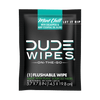12 Natural Stool Softeners to Unclog Your Colon Fast
As you’re reading this, approximately four million Americans are struggling to take a dump. Chronic constipation is legitimately one of humanity’s biggest health problems, resulting in millions of doctor’s visits every year.
As dudes who wipe butts for a living, this obviously disappoints us. Accordingly, we rounded up 12 of the best natural stool softeners to turn that dry lump of crap in your colon into a smooth brown sausage that glides out of your butt with ease.
Whether you’re too lazy to drive to the drug store or you just want to cure your constipation the natural way, try these natural stool softeners to unclog your colon fast.
12 Natural Stool Softeners
As the name implies, stool softeners make your poop more squishy, usually by bringing more fluid into your bowel. There are dozens of foods and drinks that can soften your stool quickly, but most of them fall into one of these categories:
- High fiber content
- Improves hydration
- Rich in probiotics
Let’s break down 12 of the most effective natural stool softeners backed by science.
1. Water
Dehydration is one of the most common causes of constipation. Before you make any big changes to your routine, make sure you’re drinking enough water—about 15.5 cups a day for dudes. Increasing water content inside your gut helps soften your stool and stimulates bowel movements.
2. Plums & Prunes
Plums are packed with dietary fiber and have been used as a natural constipation treatment for decades. In a 2011 study, adults who ate dried plums (AKA prunes) improved their stool consistency and had more bowel movements after eight weeks.
3. Chia Seeds
One ounce of chia seeds contains a whopping 11 grams of fiber. Specifically, chia seeds are full of insoluble fiber, which absorbs fluids and creates soft, bulky stool.
“When chia seeds absorb water, they take on a gel-like consistency,” says dietitian Beth Czerwony, RD, LD. “They add bulk and weight to stools, which softens them and helps them pass.”
One of the most popular chia seed concoctions is the “internal shower” drink, which consists of 1-2 tablespoons of chia seeds mixed into a 10-ounce glass of water.
4. Flaxseed
A 2020 study found that flaxseed supplements increased people’s bowel frequency from two movements per week to seven! This is most likely due to flaxseed’s soluble fiber content, which makes poop softer and easier to squeeze out.
Start with 1-4 tablespoons of ground flaxseed per day. You can mix it into oatmeal, cereal, yogurt, or smoothies.
5. Olive Oil
The healthy fats in olive oil literally lube up your bowel so poop can slide out more easily. Olive oil also helps your poop retain more water, making it softer.
Olive oil made headlines for its laxative effect when Starbucks launched their Oleato line of coffee products, which sent customers sprinting to the nearest toilets.
6. Mineral Oil
Mineral oil is a lubricant laxative that works by keeping water in your poop and intestines. You can drink the liquid, swallow a capsule, or use an enema (by far the least convenient option).
It takes about 8 hours for mineral oil to trigger a bowel movement, so make sure you plan your dose accordingly.
7. Epsom Salt
Epsom salt contains magnesium and sulfate—two minerals known to aid digestive health. When taken orally, epsom salt sends water into your intestines, softening your stool.
One study from 2015 found that drinking 300-500 milliliters of mineral water daily had better stool consistency and had more “spontaneous” bowel movements. Translation: they didn’t have to force out their dookies on the toilet.
8. Probiotics
Probiotics are healthy bacteria found in fermented foods. They protect your gut microbiome, improve digestion, and keep your stool soft and smooth, according to The American Journal of Clinical Nutrition.
You can take probiotic supplements, but you can also increase your probiotic intake by eating fermented foods, such as:
- Yogurt
- Kefir
- Sauerkraut
- Kimchi
- Kombucha
- Tempeh
9. Psyllium Husk
Psyllium husk is a type of soluble fiber that comes from the seeds of Plantago ovata, an herb grown mainly in India. It’s the main ingredient in Metamucil, one of the most popular fiber supplements in the world.
When you ingest psyllium, it absorbs water and forms a thick, gel-like compound that passes through your intestine without fully breaking down.
10. Pulses
“Pulses” is an umbrella term for beans, lentils, and peas—all of which are natural laxatives. Just 100 grams of cooked pulses contains about 26% of your daily fiber intake.
Anybody who has ever devoured a bean burrito knows they can kickstart a bowel movement fast. But you can also get the same effect from peas, lentils, and garbanzo beans (AKA chickpeas).
11. Whole Grains
Whole grains are a powerhouse for healthy poop. They’re loaded down with fiber that increases the water content of your stool. Adults should aim to eat about 48 grams of whole grains per day, which you can get from oatmeal, whole grain bread, brown rice, buckwheat, quinoa, and much more.
12. Aloe Vera
Aloe vera is famous for sunburn relief, but it’s effective for constipation relief too. Historically, aloe vera juice has been used to treat gastrointestinal health issues like cramping, bloating, abdominal pain, bad gas, and irritable bowel syndrome (IBS).
The compounds in aloe reduce inflammation in the digestive tract, which can help make it easier to pass stool.
Stool Softeners vs. Laxatives: What’s the Difference?
The terms “stool softener” and “laxative” are often used interchangeably, and while they both help you poop, there are some key differences.
A laxative is basically any substance that stimulates a bowel movement. One of the most popular types is a stimulant laxative (like Dulcolax), which causes muscle contractions in your intestines.
Then there are emollient laxatives (AKA stool softeners) that add liquid to your poop, making it easier to push out. Stool softeners don’t produce the same “explosive” effect as a stimulant laxative and usually take longer to work.
Bottom line: all stool softeners are laxatives, but not all laxatives soften your stool.
What If Natural Stool Softeners Don’t Work?
If home remedies for constipation don’t do the trick on the toilet, the next best option is to pick up an over-the-counter laxative like Dulcolax (Bisacodyl) or MiraLAX (Polyethylene glycol). These will only cost you $5-10 and are pretty darn reliable when you need to drop a deuce fast.
The side effects are pretty tame and may include stomach pain, mild cramping, nausea, diarrhea, faintness, and rectal burning—all small prices to pay for the sweet relief of pooping.
As you can see, there are countless tactics you can employ to coax that brown snake out of your b-hole. Butt there’s only one way to clean your third pit once the deed is done: DUDE Wipes.









